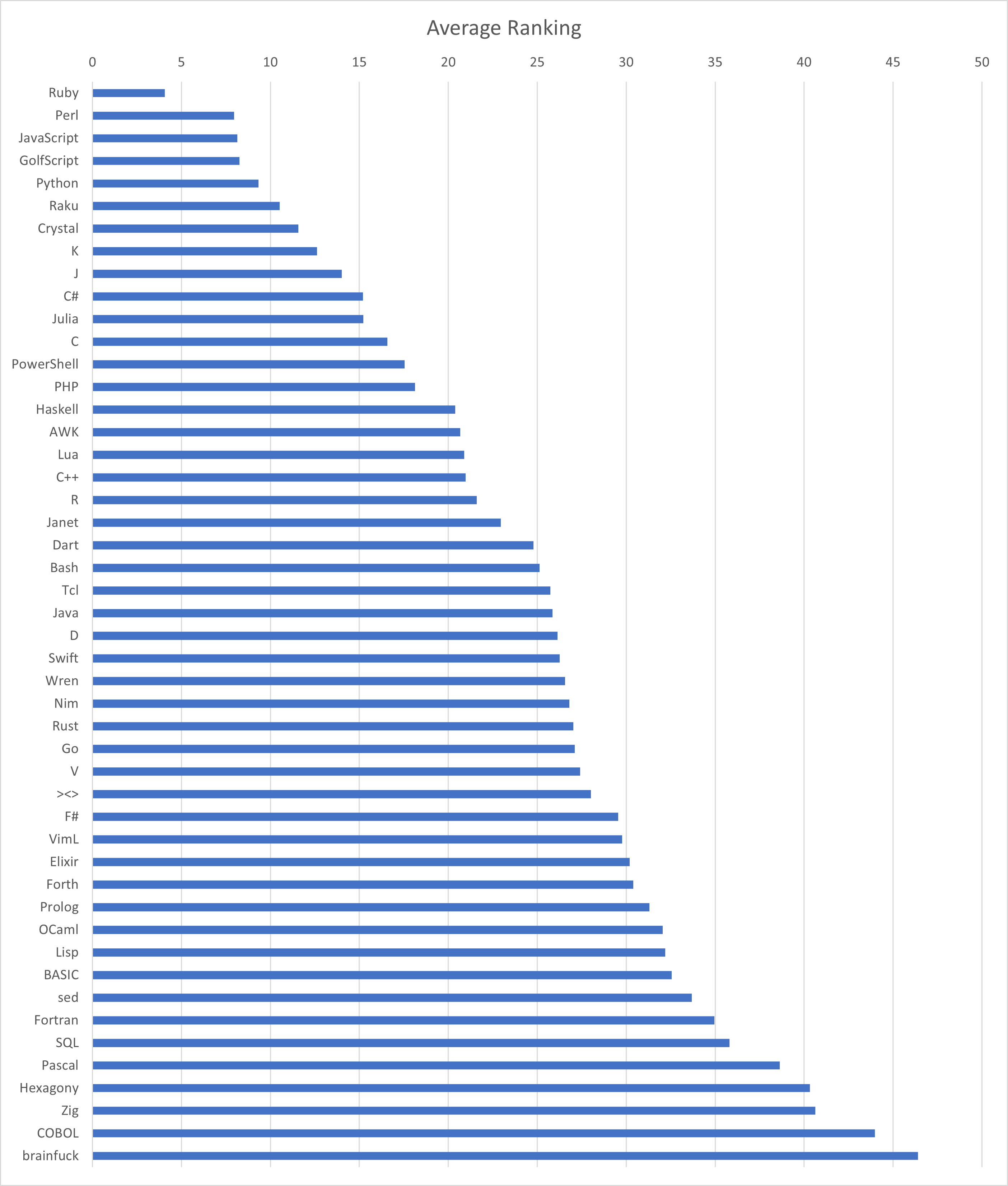I was looking at code.golf the other day and I wondered which languages were the least verbose, so I did a little data gathering.
I looked at 48 different languages that had completed 79 different code challenges on code.golf. I then gathered the results for each language and challenge. If a “golfer” had more than 1 submission to a challenge, I grabbed the most recent one. I then dropped the top 5% and bottom 5% to hopefully mitigate most outliers. Then came up with an average for each language, for each challenge. I then averaged the results across each language and that is what you see here.
For another perspective, I ranked each challenge then got the average ranking across all challenges. Below is the results of that.

Disclaimer: This is in no way scientific. It’s just for fun. If you know of a better way to sort these results please let me know.
Why is sql so low?
Because the other languages use more characters on average like it says?
It’s probably not used much for code golf, except for when it can be leveraged for specific tasks in which it excels.
Java placed way better than I expected
System.out.print("I agree.");Don’t you mean:
class AgreementManagerClass { public static void main(String[] args) { System.out.println("I agree."); } }
They weren’t writing enterprise Java or they’d need a dozen factories and a few factory factories and probably a factory factory factory just to be safe.
Ya but then you’ll need a factory for all of those factories
You’re confused, I get it. You only need one factory factory as long as you sprinkle Inversion of Craziness (IoC) all over everything. Also, for this to work you must spread your code into as many files/directories as possible and also make sure you use really, really strict and verbose XML that doesn’t just define how your code runs but instead generates code itself.
I highly suspect the reason why Java didn’t seem to have as much code is because the authors were using proper enterprise Java which is mostly XML that can only be understood if your IDE takes at least 5 minutes to open and another 5 to open your project.
Code Golf rules allow people to submit an anonymous function instead of a full program, which eliminates a lot of the boilerplate.
What’s interesting to me is how differently C# scored vs Java.
I don’t know the specifics of the golf problems, but I’m mostly in c#, also notorious for “having too much boilerplate,” and it looks like it’s 3rd by char count.
My guess is that languages with comprehensive standard libraries can do more with less custom code. As you should expect.
And yet C with its not at all comprehensive standard library did well. I’m a bit puzzled about these results.
There’s no way that Go is more verbose than Java. I’ve written both in decent quantities and Java was always way more verbose than Go for me. I suspect it’s the nature of code.golf giving these results more than the languages themselves.
It is always dismissed as too verbose, while in go’s case it is never mentioned, when in fact the latter is way more verbose… People’s bias show.
Maybe also bias by the number / experience of people using it.
1st semester students getting shocked by
public static void main(String args)and meming it on the internet.Go on the other hand likely isn’t a common choice / option for a first language.
I will gladly complain any day about go being terribly verbose.
Go’s less verbose than Java in my experience. And I’ve written quite a lot of both. But YMMV.
My mileage has indeed varied.
I wonder if it’s all those variables named with single letter and abbreviations, so annoying to code review
String IDontKnowWhatsWorseEspeciallyWhenTheTypeIsAlsoIncludedString = “I don’t know what’s worse, especially when the type is also included”;
Honestly, I prefer an overly long name over some cryptic naming scheme that looks like minified JS. At least you can be sure of the variable’s purpose and don’t have to guess, which is far better for readability.
You can write concise Java. Just like you can write readable Haskell. It’s just not idiomatic to do so.
Yes, but it looks like it is already I think more than twice as verbose as Python.
deleted by creator
How come kotlin isn’t there
Apparently it due to an issue with Kotlin - https://github.com/code-golf/code-golf/issues/151#issuecomment-1126266250
Is Dart inherently verbose, or does it just seem that way because people are using it to make Flutter widgets and they’re verbose? When you look at the Dart syntax it doesn’t seem like it needs to be verbose, but Flutter code certainly can be.
This is from codegolf competitions, so non-Flutter I’d assume.
Idk, in my short experience with it, it feels very Java like in verbosity
I’d love to see the same comparison with more real-world use-cases.
Code golf, is mostly pretty simple use-cases, which have been optimized many times over.
When, you build out an application with a user-interface, proper event handling, etc… c++ is MUCH more verbose then c# for example, and they are ranked pretty close together.
I think code golf is a great dataset for this kind of analysis specifically because they are artificial and people are paying attention to the number of characters used. Leetcode solutions might be a better option though.
In real world projects there are too many confounding factors. People aren’t implementing servers in brainfuck or websites in C. Even rewrites of a project into another language have more/fewer features. So it’s an apples to oranges comparison.
But a big problem with this dataset is error handling - or really the complete lack thereof. Real code needs to deal with errors and they can add a lot depending on the language.
I was very surprised to see rust and go so close as I find go vastly more verbose due to error handling and need to reimplement things like searching a list. But code golf type problems ignore these types of things that you see in real code.
So there is not really and useful conclusion that can be made except if you spend all day writing code golf problems.
That’s true, and you can also combine multiple errors to have a single catch block or handle each error separately. The perfect dataset for this comparison will need to be written. Code golf data is good enough for a non-academic fun analysis like this one.
Why would golfscript be more verbose than some others? Isn’t it made for golfing?
Rest in pieces golfcels it’s pychad time
Just gonna drop by to say that I love Crystal
Are you using it for scientific stuff? Are you doing Crystal Math? (/s)
How is it’s current state for building windows binaries? As a game dev who wants to fiddle with doing “everything from scratch” at least once, Crystal always seemed extremely enticing, the syntax more so than Nim
I’m unsure sorry, I’ve only ever used it on Linux.
Functional but missing a couple of features
What the heck is brainfuck?? Maybe a hot take but I wouldn’t wanna program in that /s
https://en.m.wikipedia.org/wiki/Brainfuck
For those wondering (like myself)
------[–>+++<]>.--------.-.----------.+.+++++++++++++.[–>+++++<]>+++.+[->+++<]>+.+…[—>+<]>+++.++[---->+<]>+.+[----->+<]>+.+++++++.-.++++++.
Bless you
With my professional experience in COBOL, I can honestly say I’m not surprised at all!
I’m suprised by F# position
I had a fun hour looking up some of these. I also noticed the absence of Assembler. Fun post.
For some reason their API would not return anything for assembly. I was curious to see where it would rank too,
Hmm interesting, I would’ve thought that Haskell would rank much higher
it’s probably not code golfed and the type signatures probably weren’t elided. because otherwise I’d expect it to be above javascript.
Interesting that zig is so much lower than c in expressiveness. Isn’t that a bit weird?
On another look, though, we have to keep in mind, though that this is code-golf, so in no way representative for actual code-bases.
















